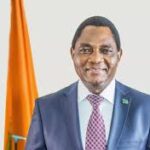The political landscape in The Gambia has been thrown into turmoil after police forcibly removed the country’s auditor general, Momodou Ceesay, from his office in Banjul following a dramatic standoff that has sparked public outrage and fueled accusations of government overreach and corruption. Ceesay, who has served nearly three years as auditor general, was at the center of a heated confrontation after refusing to vacate his post in a government reshuffle ordered by President Adama Barrow.
According to reports, President Barrow had recently offered Ceesay the position of trade minister as part of a wider cabinet shake-up. While the president insists that Ceesay initially accepted the new appointment before later backtracking, Ceesay has firmly rejected this claim, stating that he turned down the post and had no intention of abandoning his role as auditor general. His defiance has resonated with many Gambians, who view the auditor general’s independence as crucial in holding the government accountable.
Critics allege that the president is attempting to install a more compliant figure in the National Audit Office to shield his administration from ongoing corruption allegations. In Ceesay’s place, Barrow promoted the Director of Internal Audit, Cherno Amadou Sowe, to the top post, but Sowe has yet to assume the role amid widespread backlash and fears of further public unrest.
Events came to a head on Monday when plain-clothed police officers stormed the auditor general’s office with orders to arrest Ceesay and forcibly install his successor. Staff members of the National Audit Office resisted the officers’ attempt, and the tense scenes were broadcast live on social media platforms by local news outlets, drawing nationwide attention. The confrontation escalated until additional police reinforcements arrived, leading to Ceesay’s removal from a press conference he was holding inside the complex. He was escorted out under heavy security and taken to his lawyer’s office, in a move that immediately triggered widespread condemnation.
The removal provoked an immediate outcry from Gambian youths and civil society activists, many of whom accused the government of trampling on democratic institutions and undermining accountability. Protest calls spread quickly online, with young people vowing to take to the streets in the outskirts of the capital, Banjul, until Ceesay was reinstated. Prominent Gambian activist Kemo Fatty expressed his outrage in a video clip that has since gone viral, directly challenging President Barrow’s actions. “He refused your appointment. Now you forcibly remove him out of the office? Are the Gambian people not watching?” Fatty asked, before issuing a sharp warning: “If the auditor general does not return to office today, President Barrow will leave the State House today.”
The bold statement intensified tensions, and both Fatty and another outspoken anti-corruption campaigner, Alieu Bah, were arrested by police shortly after they gathered at the national audit office to prepare for a press briefing. Their detention has fueled further anger, with rights advocates describing it as an attempt to silence dissenting voices and intimidate critics of the administration.
This latest confrontation comes at a time when President Barrow’s government is already facing mounting scrutiny. In recent months, mass protests have rocked the country following revelations by investigative newspaper The Republic, which alleged that assets belonging to former President Yahya Jammeh, who ruled The Gambia with an iron fist until 2017 had been redistributed among Barrow’s close allies. While Barrow has repeatedly denied the accusations, the scandal has severely dented public trust in his administration and emboldened calls for greater accountability.
In response to the escalating crisis, the president’s office released a statement insisting that the government remains “firmly committed to the rule of law, transparency, accountability, and the responsible management of public finances.” The statement defended the decision to appoint Ceesay as trade minister, describing it as “based solely on his qualifications and experience” and denying that the reshuffle was designed to compromise the independence of the National Audit Office.
Despite the official stance, many Gambians remain unconvinced. The forced removal of Ceesay has not only deepened suspicions of corruption within the government but has also intensified fears about the erosion of democratic institutions in the small West African state. As protests loom and civil society groups mobilize, the crisis represents one of the most serious challenges to President Barrow’s leadership since he came to power, raising questions about the future of accountability, transparency, and governance in The Gambia.














Leave a comment